The ICSE Class 10 syllabus for the academic year 2025-26 has been released by the CISCE. The ICSE syllabus class 10 pdf for all subjects is available on the official website: cisceboard.org/.
- The syllabus is divided into theory and practical exams. For most subjects, students will have both written exams and practical exams (especially in science and languages).
- The ICSE class 10 syllabus is divided into three sections: Group 1 (Compulsory Subjects), Group 2 (Elective Subjects), and Group 3 (Additional Elective).
- Each group has 80 marks for the theory paper and 20 marks for internal assessment or practicals.
- The syllabus remained unchanged for this session, 2025-26, allowing students to build upon their prior learning.
In this article for ICSE syllabus class 10 students can find the detailed subject-wise syllabus, weightage, and previous years’ question papers for the class 10 exam.
Also Check:
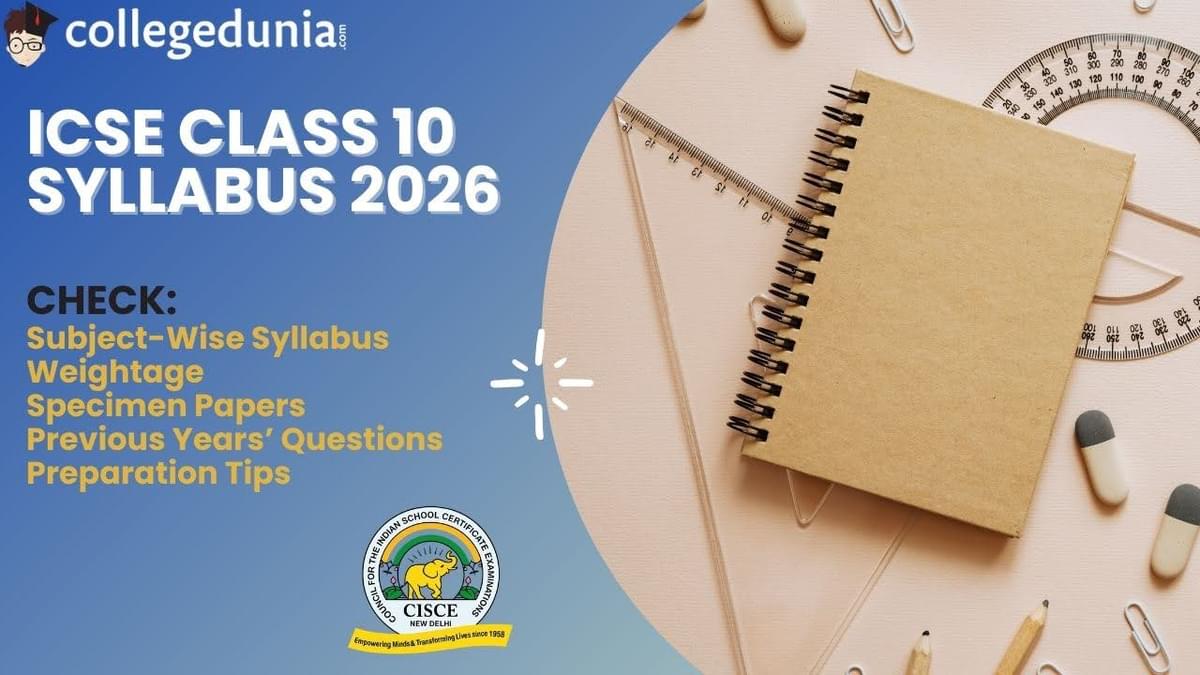
Key Summary
- In this article we discussed the ICSE class 10 syllabus for 2025-26, including the subject-wise syllabus, weightage, and previous years’ question papers.
- The Class 10 syllabus pdf for all subjects is available on the official website; students can download the syllabus from the website.
- The syllabus is divided into theory and practical exams. For most subjects, students will have both written exams and practical exams.
- The ICSE class 10 syllabus is divided into three sections: Group 1 (Compulsory Subjects), Group 2 (Elective Subjects), and Group 3 (Additional Elective).
- Each section of the class 10 syllabus carries 80 marks for the theory paper and 20 marks for the practical/internal assessments.
- What is the ICSE Class 10 Syllabus 2025-26?
1.1 ICSE Class 10 Syllabus: Overview
- ICSE Class 10 Subject-Wise Syllabus
2.1 ICSE Class 10 Syllabus: English
2.2 ICSE Class 10 Syllabus: Indian Language
2.3 ICSE Class 10 Syllabus: History and Civics
2.4 ICSE Class 10 Syllabus: Geography
2.5 ICSE Class 10 Syllabus: Math
2.6 ICSE Class 10 Syllabus: Physics
2.7 ICSE Class 10 Syllabus: Chemistry
2.8 ICSE Class 10 Syllabus: Biology
- ICSE Class 10 Subject-Wise Weightage
3.1 ICSE Class 10 English Weightage
3.2 ICSE Class 10 Maths Weightage
3.3 ICSE Class 10 Physics Weightage
3.4 ICSE Class 10 Chemistry Weightage
3.5 ICSE Class 10 Biology Weightage
3.6 ICSE Class 10 Geography Weightage
3.7 ICSE Class 10 History & Civics
- ICSE Class 10 Sample Paper 2025
- ICSE Class 10 Previous Years’ Question Papers
- ICSE Class 10 Exam Preparation Tips
- FAQs
What is the ICSE Class 10 Syllabus 2025-26?
The ICSE syllabus class 10 pdf for all subjects is available on the official website. Students can download the subject-wise syllabus from the website.
The ICSE syllabus class 10 is structured into three primary groups:
- Group I (Compulsory Subjects): English, a second language, history & civics, and geography.
- Group II (Elective Subjects): Students select two subjects from options such as Mathematics, Science (Physics, Chemistry, Biology), Economics, Commercial Studies, Modern Foreign Languages, and Classical Languages.
- Group III (Additional Electives): Choices include environmental science, computer applications, home science, physical education, art, and commercial applications.
ICSE Class 10 Syllabus: Overview
| Particulars | Details |
|---|---|
| Exam Name | ICSE Class 10 Examination |
| Session | 2025–26 |
| Conducting Authority | Council for the Indian School Certificate Examinations (CISCE) |
| Mode of Exam | Offline (Written Exam) |
| Subjects Covered | English, Second Language, Mathematics, Science (Physics, Chemistry, Biology), History & Civics, Geography, Economics, Commercial Studies, Computer Applications, Home Science, Art, Physical Education |
| Assessment Pattern | External Exam: 80 marks per subject; Internal Assessment: 20 marks (projects, practicals, oral tests) |
| Syllabus Focus | Comprehensive coverage to develop analytical thinking, problem-solving, communication skills, and practical application |
| Exam Duration | Typically 3 hours per subject |
| Official Website | cisce.org |
ICSE Syllabus for Class 10 FAQs
Ques. What is the ICSE syllabus for class 10?
Ans. The ICSE Class 10 syllabus includes subjects like English, Mathematics, Science (Physics, Chemistry, Biology), History, Civics, Geography, Economics, Commercial Studies, Computer Applications, and more.
Ques. Is 70% bad in ICSE?
Ans. No, 70% is not a bad score for ICSE class 10. Scoring 70% in ICSE is a good mark considered more than an average percentage to proceed for higher education and admission.
Ques. Is ICSE better than CBSE?
Ans. Neither ICSE nor CBSE is inherently better. The ideal choice depends on a student's goals, learning style, and future aspirations. CBSE is often preferred for its focus on national competitive exams like JEE and NEET and its more concise, exam-oriented curriculum. ICSE is favored for its comprehensive, detailed syllabus emphasizing holistic development, application-based learning, strong English proficiency, and international recognition.
Ques. What is the hardest subject in ICSE Class 10?
Ans. Mathematics is regarded as the toughest subject by most of the students in Class 10 ICSE. The ICSE syllabus is elaborate and has complicated chapters like Trigonometry, Geometry, Mensuration, and Algebra.
ICSE Class 10 Syllabus: Subject-Wise
The ICSE Class 10 syllabus provides a comprehensive framework for academic learning across subjects like English, mathematics, science, social studies, and optional subjects.
The detailed subject-wise ICSE 10th exam syllabus for core subjects is given below for their board exam preparation.
ICSE Class 10 Syllabus: English
The table below gives the detailed ICSE class 10 syllabus for English Papers I and II. The ICSE Class 10 English exam paper is divided into two parts: Paper 1: English Language and Paper 2: Literature in English.
ICSE Syllabus Class 10 Paper 1: English Language
| Component | Details |
|---|---|
| Composition | Write an essay on the given topics (400–500 words) |
| Letter Writing | Formal and informal letters (requests, complaints, invitations) |
| Report Writing | Writing reports on events, incidents, or news |
| Comprehension | Reading passages and answering questions |
| Grammar | Parts of speech, sentence structure, transformations, etc. |
ICSE Syllabus Class 10 Paper 2: Literature in English
| Component | Details/Texts |
|---|---|
| Drama |
|
| Prose |
|
| Poetry |
|
ICSE Class 10 English Syllabus FAQs
Ques. What is the syllabus of class 10 English ICSE?
Ans. The ICSE class 10 English syllabus has 2 parts, one is Grammar and Writing, and the second one is Literature.
Paper 1: English Language
| Component | Details |
|---|---|
| Composition | Write an essay on the given topics (400–500 words) |
| Letter Writing | Formal and informal letters (requests, complaints, invitations) |
| Report Writing | Writing reports on events, incidents, or news |
| Comprehension | Reading passages and answering questions |
| Grammar | Parts of speech, sentence structure, transformations, etc. |
Paper 2: Literature in English
| Component | Details/Texts |
|---|---|
| Drama | Julius Caesar by William Shakespeare (Acts III, IV, V) |
| Prose | Treasure Chest (ICSE Short Stories and Poems): With the Photographer — Stephen Leacock The Elevator — William Sleator The Girl Who Can — Ama Ata Aidoo The Pedestrian — Ray Bradbury The Last Lesson — Alphonse Daudet |
| Poetry | Haunted Houses — H.W. Longfellow The Glove and the Lions — Leigh Hunt When Great Trees Fall — Maya Angelou A Considerable Speck — Robert Frost The Power of Music — Sukumar Ray |
Ques. Which is the toughest chapter in class 10 English?
Ans. There's no single "hardest" chapter for all Class 10 students, as difficulty is subjective. However, some frequently cited challenging chapters and topics include complex social commentary in stories like "Glimpses of India" and "The Portrait of a Lady," or pieces with deeper social or historical contexts such as "Nelson Mandela: Long Walk to Freedom" and "From the Diary of Anne Frank". For the supplementary reader, "The Thief's Story" and chapters exploring human nature or abstract concepts are often mentioned as difficult.
Ques. How many marks of grammar are in English class 10?
Ans. In Class 10 English, the grammar section carries 10 marks as part of the CBSE (Central Board of Secondary Education) syllabus, with the remaining 10 marks in the combined Writing and Grammar section allocated to Writing Skills. The 80-mark theory paper is divided into three sections:
- Section A: Reading Skills (20 Marks)
- Section B: Writing Skills and Grammar (20 Marks)
Grammar (10 Marks): Focuses on concepts such as determiners, tenses, modals, subject-verb concord, and reported speech (statements, questions, commands).
Writing Skills (10 Marks): Includes tasks like writing formal letters, a creative writing task, or a report. - Section C: Literature (40 Marks)
ICSE Class 10 Syllabus: Indian Language
The table below covers the details for the ICSE 10th exam syllabus for Indian Language:
| Component | Details |
|---|---|
| Languages Offered |
|
| Prescribed Texts | Literature, prose, poetry, and grammar based on the specific language chosen by the student. |
ICSE Class 10 Syllabus: History and Civics
The ICSE class 10 syllabus for social science is divided into civics and history, covering India’s political system and major historical events in the below table.
- Civics focuses on the legislature, executive, and judiciary, while history includes the Indian National Movement and contemporary world events.
| Section | Topics | Subtopics/Details |
|---|---|---|
| A: Civics | The Union Legislature |
|
| The Union Executive |
| |
| The Judiciary |
| |
| B: History | The Indian National Movement (1857–1917) |
|
| The Contemporary World |
|
ICSE Syllabus Class 10: Geography
The ICSE 10th exam syllabus for geography focuses on understanding India’s physical features, along with map interpretation skills in the below table.
- Map work emphasizes identifying important locations and interpreting topographical maps, while the Geography of India section covers resources, environment, and sustainable practices.
| Part | Topics | Subtopics/Details |
|---|---|---|
| Part 1: Map Work | Interpretation of Topographical Maps and Map of India | Identification of important locations |
| Part 2: Geography of India | Location and Physical Features | Major physical features of India |
| Climate | Climatic regions and monsoons | |
| Soil Resources | Types of soil and significance for agriculture | |
| Natural Vegetation | Forest types and conservation | |
| Water Resources | Rivers and lakes in India | |
| Mineral and Energy Resources | Key minerals and sources of energy | |
| Agriculture | Major crops and farming regions | |
| Manufacturing Industries | Types of industries and distribution | |
| Transport | Major transportation systems | |
| Waste Management | Waste disposal methods and sustainable practices |
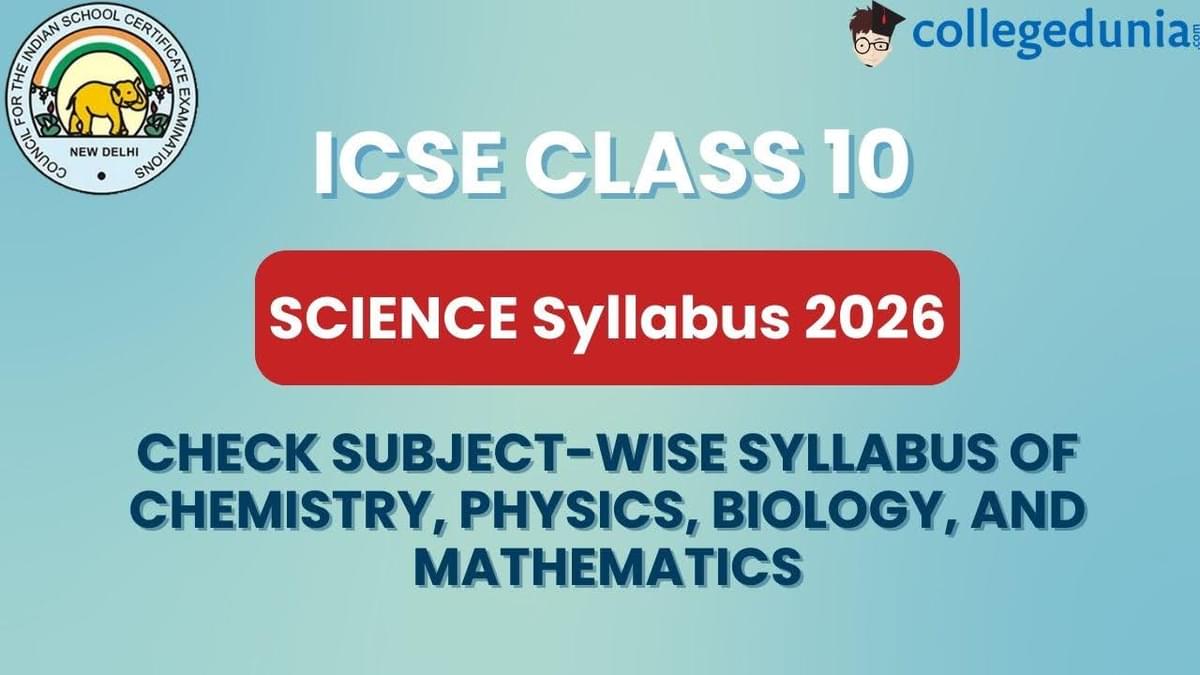
Class 10th ICSE Maths Syllabus
The ICSE Class 10 syllabus for math focuses on developing problem-solving and analytical skills across various topics in the table below.
- In Maths class 10 ICSE syllabus, Emphasis is placed on practical applications, formulae, and basic concepts to prepare students for board examinations.
| Chapter/Unit | Topics Covered |
|---|---|
| Commercial Mathematics |
|
| Algebra |
|
| Geometry |
|
| Mensuration |
|
| Trigonometry |
|
| Statistics |
|
| Probability |
|
ICSE Class 10 Maths Syllabus FAQs
Ques. What is the syllabus of ICSE Class 10 Maths?
Ans. The ICSE Class 10 Maths syllabus includes Commercial Mathematics, Algebra, Geometry, Mensuration, Trigonometry, Statistics, and Probability. Key topics are Goods and Services Tax (GST), banking, shares and dividends, linear in-equations, quadratic equations, matrices, factorization, similarity, circles, loci, area and volume of solids, and the computation of statistical measures.
Ques. Is ICSE Maths 10 difficult?
Ans. Yes, the ICSE Maths syllabus can be difficult for students. The preliminary step to developing an effective study schedule is to determine which chapters require more time and which can be learned more quickly. With consistent practice and conceptual clarity, students can ease the difficulty level of the exam.
Ques. What is the marking scheme of ICSE board exam?
Ans. The ICSE marking scheme allocates marks between external board exams and internal assessments as follows:
- 80% external assessment
- 20% internal for compulsory Group 1 & Group 2 subjects
- 50/50 split for Group 3 subjects
Students must achieve a minimum of 33% in each subject to pass. A pass certificate is issued for passing at least five subjects, including English.
Ques. Is ICSE Maths tougher than CBSE?
Ans. Yes, ICSE Mathematics is generally considered tougher than CBSE Mathematics. This is because the ICSE curriculum covers more concepts and requires a deeper understanding and practical application, demanding more diligent practice for success. In contrast, CBSE exams are often viewed as more straightforward.
ICSE Syllabus Class 10: Physics
The ICSE Class 10 syllabus for science focuses on understanding fundamental concepts in physics in the below given table.
- ICSE 10th exam syllabus topics include Force, Work & Power, Light, Sound, Electricity & Magnetism, Heat, and Modern Physics, aiming to develop problem-solving and analytical skills.
| Unit/Chapter | Topics Covered |
|---|---|
| Force, Work, Power |
|
| Light |
|
| Sound |
|
| Electricity and Magnetism |
|
| Heat |
|
| Modern Physics |
|
ICSE Chemistry Class 10 Syllabus
The ICSE Class 10 syllabus for chemistry focuses on fundamental concepts in chemical reactions, bonding, periodic properties, and the study of compounds in the following table.
- ICSE 10th exam syllabus focuses on practical applications, problem-solving, and understanding chemical processes, including organic and inorganic chemistry.
| Unit/Chapter | Topics Covered |
|---|---|
| Periodic Properties |
|
| Chemical Bonding |
|
| Acids, Bases, and Salts |
|
| Analytical Chemistry |
|
| Mole Concept and Stoichiometry |
|
| Electrolysis |
|
| Metallurgy |
|
| Study of Compounds |
|
| Organic Chemistry |
|
ICSE Biology Class 10 Syllabus
The ICSE class 10 syllabus for biology focuses on understanding life processes, plant and human physiology, population dynamics, and environmental issues like pollution in the table below.
- ICSE 10th exam syllabus emphasizes conceptual clarity, practical applications, and awareness of ecological balance.
| Unit/Chapter | Topics Covered |
|---|---|
| Basic Biology |
|
| Plant Physiology |
|
| Human Anatomy and Physiology |
|
| Population |
|
| Pollution |
|
Also Check:
ICSE Class 10 Subject-Wise Weightage
The ICSE Class 10 examinations are conducted by the Council for the Indian School Certificate Examinations (CISCE).
- The subject-wise weighting helps students prioritize their preparation according to the syllabus requirements and exam pattern by outlining how marks are allocated across topics.
- The total marks for each subject are generally 80 for theory and 20 for practicals where applicable, summing to 100 marks.
Below are the detailed subject-wise mark weightages given for the ICSE class 10 examination.
ICSE Class 10 English Weightage
The ICSE Class 10 English papers are of 80 marks each, covering writing, comprehension, grammar, and literature, and practical/internal assessments of 20 marks.
English Language (Paper 1) – 80 Marks
The tables show how marks are distributed across different sections to help students prepare effectively.
| Section | Marks |
|---|---|
| Composition | 25 |
| Letter Writing | 10 |
| Grammar | 20 |
| Comprehension | 25 |
| Total | 80 |
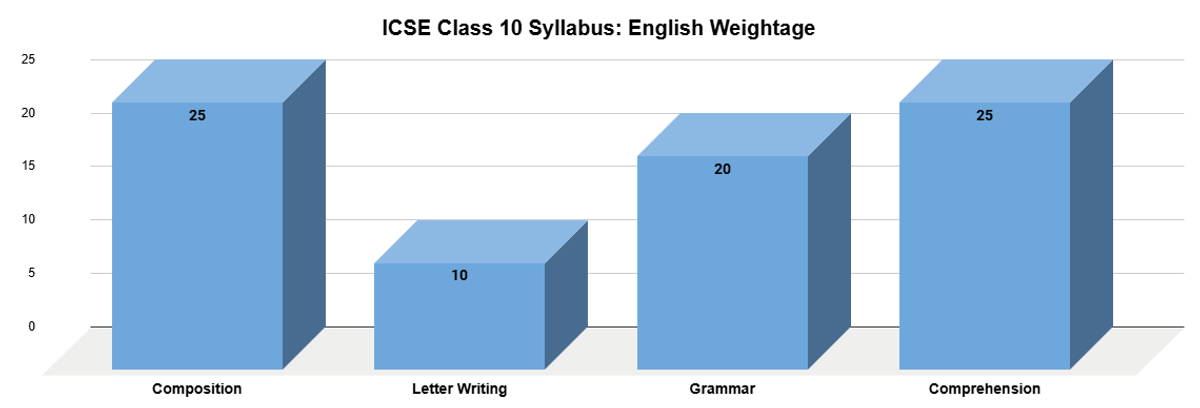
English Literature (Paper 2) – 80 Marks
Students can better prepare by using the tables, which display the distribution of marks across various sections.
| Section | Marks |
|---|---|
| Prose & Poetry | 40 |
| Drama | 20 |
| Prescribed Text | 20 |
| Total | 80 |
Class 10th ICSE Maths Syllabus Weightage
The mathematics paper's weighting is displayed in the table below, where theory receives 80 points and practical/problem-solving evaluations receive 20 out of a possible 100.
| Unit/Chapter | Marks |
|---|---|
| Commercial Mathematics | 13 |
| Algebra | 32 |
| Geometry | 20 |
| Mensuration | 10 |
| Trigonometry | 15 |
| Statistics & Probability | 15 |
| Practicals | 20 |
| Total | 100 |
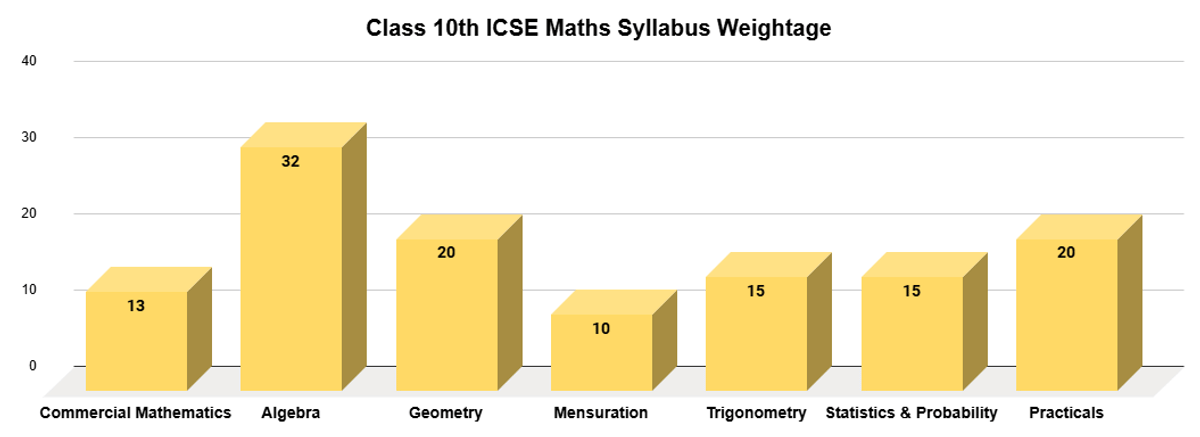
ICSE Class 10 Physics Weightage
The table below shows the physics examination carries a total of 100 marks, divided into 80 marks for theory and 20 marks for practical experiments.
| Unit/Chapter | Marks |
|---|---|
| Force, Work, Power | 10 |
| Light | 10 |
| Sound | 8 |
| Electricity & Magnetism | 12 |
| Heat | 10 |
| Modern Physics | 8 |
| Practicals | 20 |
| Total | 100 |
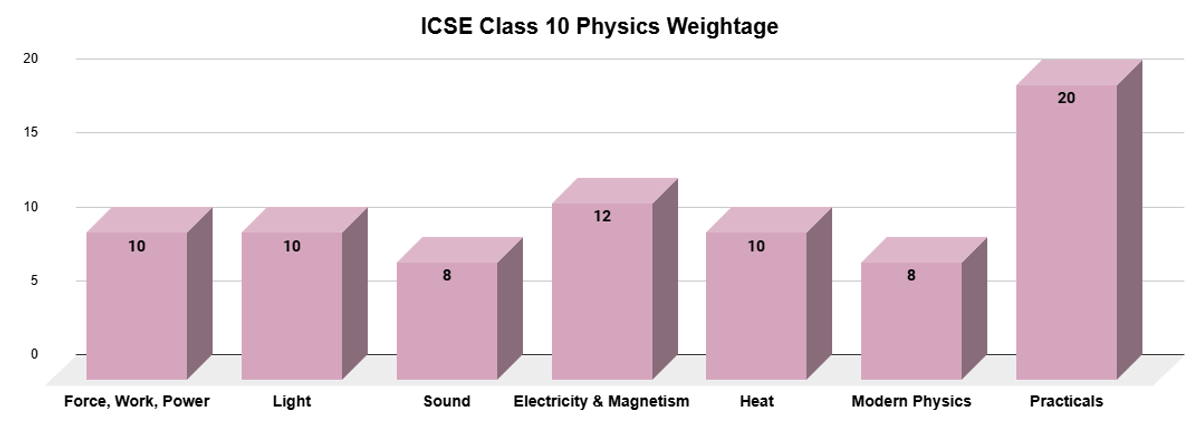
ICSE Class 10 Chemistry Weightage
The table below illustrates that the 100-mark chemistry paper consists of 20 marks for practical work and 80 marks for theoretical questions.
| Unit/Chapter | Marks |
|---|---|
| Periodic Properties | 5–7 |
| Chemical Bonding | 8–10 |
| Acids, Bases, and Salts | 6–8 |
| Analytical Chemistry | 5–7 |
| Mole Concept & Stoichiometry | 8–10 |
| Electrolysis | 5–7 |
| Metallurgy | 6–8 |
| Study of Compounds | 6–8 |
| Organic Chemistry | 5–7 |
| Practicals | 20 |
| Total | 100 |
ICSE Class 10 Biology Weightage
The biology exam consists of 80 theory points and 20 practical points, for a total score of 100, as the table below shows.
| Unit/Chapter | Marks |
|---|---|
| Basic Biology | 12–15 |
| Plant Physiology | 8–10 |
| Human Anatomy & Physiology | 12–15 |
| Population | 6–8 |
| Pollution | 6–8 |
| Practicals | 20 |
| Total | 100 |
ICSE Class 10 Geography Weightage
The geography paper has 100 marks, as indicated in the table below, with 80 marks allocated for theory and 20 marks for fieldwork and practical map work.
| Unit/Chapter | Marks |
|---|---|
| Map Work | 15–20 |
| Physical Features | 10–12 |
| Climate | 8–10 |
| Soil Resources | 6–8 |
| Natural Vegetation | 6–8 |
| Water Resources | 6–8 |
| Mineral & Energy Resources | 6–8 |
| Agriculture | 6–8 |
| Manufacturing Industries | 6–8 |
| Transport | 6–8 |
| Waste Management | 6–8 |
| Map Work | 20 |
| Total | 100 |
ICSE Class 10 History & Civics
According to the table below, the History & Civics paper has a total score of 100, with 80 points awarded for theory and 20 for practical or project-based evaluations.
| Section | Topics | Marks |
|---|---|---|
| History | National movements, world wars, etc. | 50 |
| Civics | Legislature, executive, judiciary | 30 |
| Practical/Projects | - | 20 |
| Total | - | 100 |
The ICSE Board has released the specimen papers for different subjects. Students can download the PDFs of Class 10 Specimens Papers 2025 of different subjects from the below table:
| Subjects | Sample Papers |
|---|---|
| English Language | Download PDF |
| English Literature | Download PDF |
| Physics | Download PDF |
| Chemistry | Download PDF |
| Math | Download PDF |
| Biology | Download PDF |
| History & Civics | Download PDF |
| Geography | Download PDF |
| Economics | Download PDF |
| Commercial Studies | Download PDF |
| Computer Applications | Download PDF |
| Physical Education | Download PDF |
ICSE Class 10 Previous Years’ Question Papers
The table below contains the ICSE Class 10 question papers. This will help the students to know the structure of the question papers in the ICSE exam:
| Subjects | Question Papers 2024 |
|---|---|
| English (Paper I) | Check Here |
| English (Paper II) | Check Here |
| History & Civics | Check Here |
| Geography | Check Here |
| Mathematics | Check Here |
| Physics | Check Here |
| Chemistry | Check Here |
| Biology | Check Here |
| Economics | Check Here |
| Physical Education | Check Here |
| Computer Applications | Check Here |
ICSE Class 10 Exam Preparation Tips
Some of the effective preparation tips and how to implement them for students of class 10 are given below:
| Tips | Details |
|---|---|
| Focus on Syllabus | Go through the entire syllabus and mark the important chapters that have high weightage. |
| Study Schedule | Make a study schedule and allocate 1-2 hours to each subject according to difficulty and weightage. |
| Practice Previous/Sample Papers | Try to solve the last 5-10 years’ question papers and sample papers to know the exam pattern and time constraints. |
| Revise Regularly | Revise important topics of each subject regularly to avoid last-minute cramming. |
| Make Notes | Make short notes, formulas, diagrams, and key points to revise. It will help in revision. |
| Stay Positive and Healthy | Eat a balanced diet and sleep for at least 7-8 hours. Always keep your mindset positive to avoid stress. |
FAQs
Ques. What is the syllabus of ICSE class 10?
Ans. The syllabus of the ICSE class 10 with subjects and key topics covered is given below:
| Subject | Key Topics |
|---|---|
| English | Reading comprehension, writing skills (letters, essays, reports), grammar, literature (poems, prose, plays) |
| Mathematics | Algebra, Geometry, Trigonometry, Mensuration, Statistics, Probability |
| Science | Physics (light, electricity, magnetism), Chemistry (acids, bases, salts, metals), Biology (life processes, reproduction, environment) |
| History & Civics | National movement, constitutional development, fundamental rights, democracy, world wars, post-independence India |
| Geography | Physical features, climate, natural resources, industries, population, environmental issues |
| Second Language (Hindi/Regional) | Grammar, reading comprehension, writing, literature selections |
Ques. Is ICSE better than CBSE?
Ans. The comparison between the ICSE and CBSE boards is given below:
| Aspect | ICSE | CBSE |
|---|---|---|
| Syllabus | Broader, includes literature, arts, and languages | Simple, focused on science and math |
| Difficulty | Slightly tougher with detailed content | Easier, more exam-oriented |
| Language | English-based, strong on grammar and writing | Bilingual, easier for practical understanding |
| Career Focus | Good for higher studies abroad | Good for entrance exams in India |
| Flexibility | More subject choices | Limited electives |
Ques. Is 70% good in ICSE?
Ans. 70% is considered good in ICSE because the syllabus is detailed and challenging. It shows you are doing well, and with more effort, you can aim even higher.
Ques. What is the toughest subject in ICSE Class 10?
Ans. The toughest subjects in ICSE class 10 are:
- Because of their technical content and intricate numerical problems, science and mathematics are frequently regarded as the most difficult subjects.
- Students who study English and history also face difficulties with lengthy writing assignments and fact and data memorization.
Ques. Which subject has the highest score in ICSE Class 10?
Ans. The highest-scoring subject in the ICSE class 10 is given below:
- Students can achieve the best grades in science, math, and English if they are well-prepared.
- Effective practice, conceptual clarity, and writing abilities are essential for maximizing scores.
Ques. Is ICSE very tough?
Ans. ICSE is not impossible, but it’s considered tougher because of its detailed syllabus and emphasis on language and conceptual understanding.
- With proper planning, practice, and time management, students can perform very well.





Comments